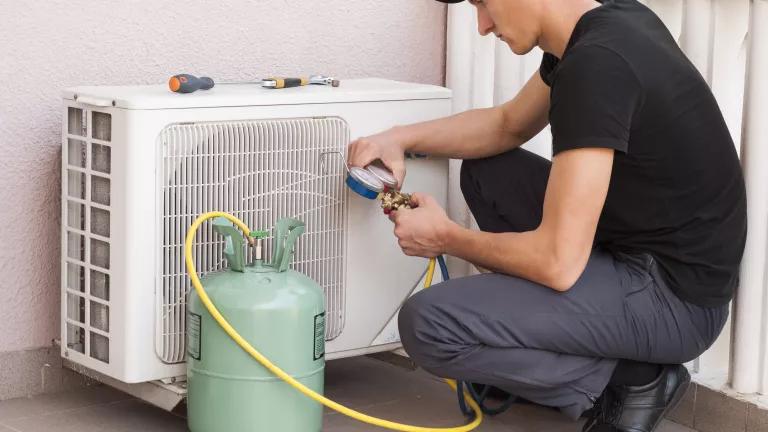Don’t Let Refrigerants Slow Heating Decarbonization
While it’s true that current refrigerants have climate impacts when they leak into the air, the net climate benefit of heat pump heaters and water heaters is clear even today, and it will get even better every year.

Heat pumps get a lot of attention these days as the most cost-effective and scalable heating solution for homes and other buildings. Some have raised questions about the climate impact of the refrigerants they use and have even suggested delaying your purchase of heat pumps. Fear not, while it’s true that current refrigerants have climate impacts when they leak into the air, the net climate benefit of heat pump heaters and water heaters is clear even today, and it will get even better every year. Here’s why:
Heat pumps move heat from the air or the ground to the inside of your home or your hot water tank. They need only a small amount of electricity compared to conventional electric equipment, hence their efficiencies in the 300 to 500 percent range. The electricity used to run the heat pump is not completely clean yet, but it is rapidly getting cleaner with solar and wind power becoming cheaper than fossil fuel power, and grid decarbonization will accelerate thanks to the recently passed Inflation Reduction Act.
Air conditioners (ACs) and heat pumps use hydrofluorocarbons (HFC) as refrigerants or heat transfer agents. HFCs are powerful heat-trapping pollutants when they leak from equipment. NRDC and allies have long worked to replace HFCs with safer, climate-friendlier alternatives, and we’re getting results: Congress enacted the bipartisan AIM Act in December 2020, which will phase down HFCs production by 85 percent over the next 15 years, in line with the Kigali Amendment, the global agreement to phase down HFCs around the world. Next up for the EPA is to issue new rules to end HFC use in new products where alternatives are already available, and to curb leaks and recover HFCs for reuse from existing equipment. Leading states such as California are implementing their own additional policies.
Should I wait to buy a heat pump?
What about the refrigerants used in heat pumps today? Should you wait and keep those fossil fuel furnaces and water heaters burning longer or switch to a heat pump right now? The fact is the climate benefit from ending your gas use and reducing your electricity use far outweighs the impact of current refrigerants in almost every case, so delaying would result in more, not less climate damage. And refrigerants aren’t harmful unless they are leaked. Measures to cut leakage through quality installation and servicing are discussed below.
Most current heat pumps use refrigerant R-410A with a global warming potential (GWP) of 4,260 over 20 years. This means that when a pound of refrigerant leaks into the atmosphere, it packs 4,260 times the climate wallop as a pound of CO2. Alternative refrigerants have less than a quarter to less than one percent the climate impact of R410A and other high-GWP refrigerants. That is why we’re phasing them out.
But while HFCs are bad for the climate, the CO2 and methane emissions from using conventional electric and gas equipment are much worse. That’s because GWP alone is not all that matters—the quantity of gas that is emitted multiplied by its GWP determines the climate harm and producing and delivering electricity and gas causes far more tons of those pollutants to be released than HFCs. Researchers at UC Davis demonstrated this in a study that we summarized here: The Climate Math of Home Heating Electrification. When accounting for all emissions from heating, including those from power plants that power heat pumps and furnace blowers, refrigerant leakage, CO2 and methane emissions from gas furnaces, today’s heat pumps cut emissions by 45 to 70 percent vs. gas furnaces. And that study was done before the Inflation Reduction Act passed and does not include its effect on accelerating the decarbonization of the power grid.

Breakdown of Greenhouse Gas Impacts from Gas Furnace and Electric Heat Pump Heating over a 20-Year Horizon
Here are the key takeaways:
- Refrigerant emissions remain marginal vs. CO2 and methane emissions: The heat-trapping emissions of CO2 emissions from gas combustion, and of methane emissions from gas wells and pipeline leaks, vastly outweigh average refrigerant emissions. While some ACs and heat pumps do leak, major leaks are easily avoidable with proper installation and maintenance.
- Take charge: Concerned home and building owners can reduce these leaks by choosing HVAC installers and repairers who check for and fix leaks before filling or refilling the equipment with HFCs during installation or maintenance. Homeowners can also choose service providers who recover refrigerant at the end of the equipment’s life. Installers know how to do it, and many do it well. You can insist that your technician takes extra care at handling and reclaiming refrigerant and complies with Federal law that prohibits service providers from knowingly venting refrigerants into the atmosphere.
- High-GWP refrigerants are getting too expensive to waste: As the supply of HFCs ramps down, R410A prices will increase sharply and are already beginning to do so, bringing a new focus on refrigerant conservation, reclaim, and reuse.
- What would happen otherwise? Most U.S. residents already have air conditioning, and many more will want it over the next few years to fend off worsening heat waves. ACs also use, and leak, refrigerant. When considering the refrigerant impacts of a heat pump, it is important to compare it with that of AC in homes that have or will get it. Even though heat pumps use a little more refrigerant than traditional ACs, their overall climate impact is much lower than a furnace and an AC combined.
- The earlier we start, the earlier we arrive: Even in homes that do not have AC and are not planning to get it soon, it still makes sense to decommission these fossil fuel guzzling appliances as soon as possible since it will take decades to fully transition all buildings off fossil fuels. Any refrigerant impacts by a small number of units in the early years of the market transition are vastly outweighed by the benefits of phasing out fossil fuels from the entire building stock earlier. The raging heat waves, wildfires, and floods are stark reminders that we do not have years to waste to get off fossil fuels. And with rebates and tax credits from the Inflation Reduction Act, the time is now.
- Last but not least: save money: switching your furnace, AC, and water heater for heat pumps will save you money in two ways: 1) From your own utility bills because heat pumps, particularly the more efficient models, cost less in electricity bills than gas appliances in gas bills. Heat pumps help households avoid the gas price escalation that has resulted from the Russian energy war; 2) As more people use heat pumps, fixed grid costs will be spread over more kilowatt-hours, putting downward pressure on electricity rates and benefitting everyone from lower electricity prices.
We need to cut all climate-warming emissions: CO2 from burning fossil fuels, methane from gas system leaks, and refrigerant leaks from equipment. Heat pumps can do all three, today.




